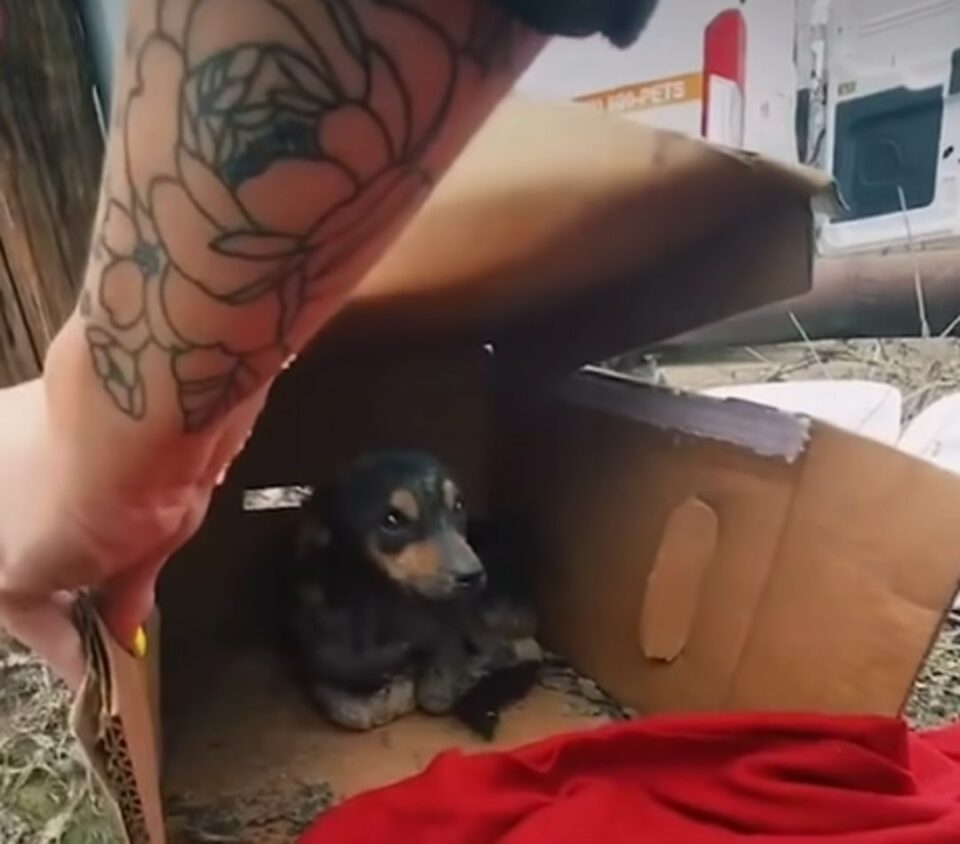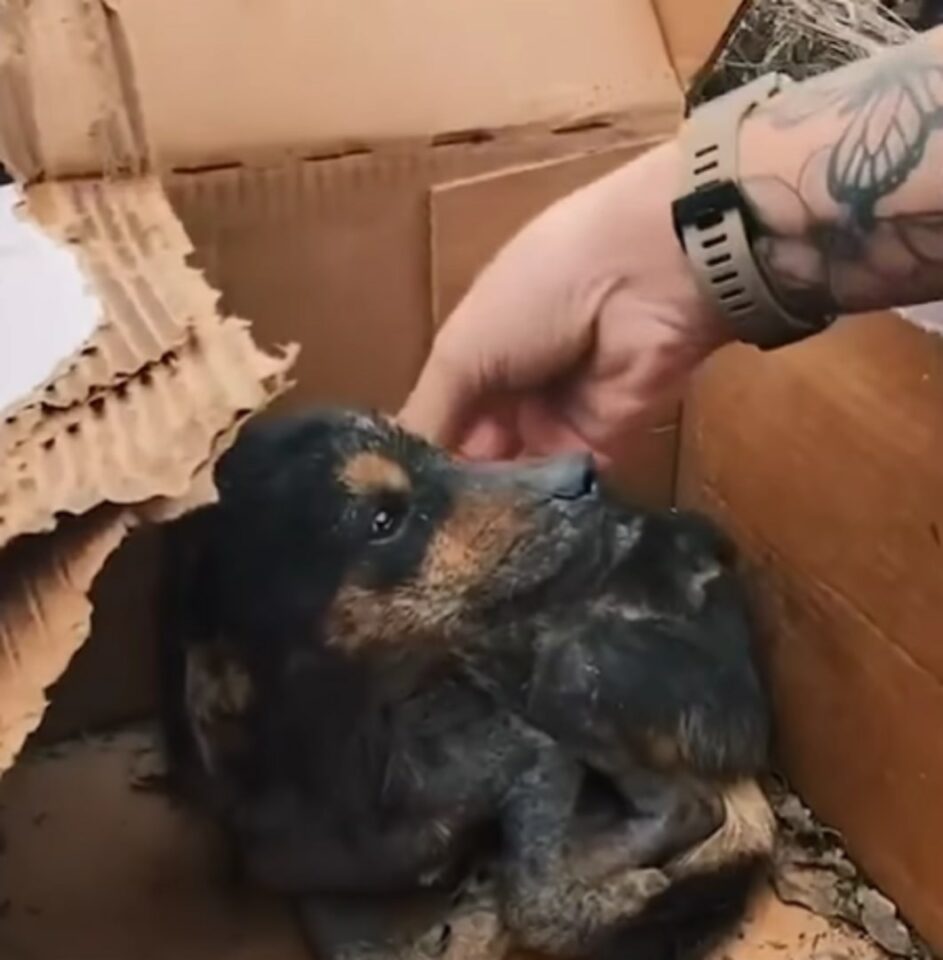Abandonment is a long-term trauma that many dogs never recover from. Being dumped in the worst of places, these four-legged creatures have only one goal — to stay alive and survive the potential danger.
Alejandro here is no exception.
When he was cruelly abandoned in a random orchard, he immediately ran to find shelter. But, instead of a warm room and a solid roof above his head, all he could find was one teeny-tiny box.
The Sweetest Surprise In A Box

When the good people of Fresno Humane Animal Services, California, first found Alejandro, they were shocked by what they saw.
He was literally hiding in a cardboard box from the rain and potential predators around. Yet, when they approached him, he had the sweetest smile on his face. It was as if he was patiently waiting all this time for kind humans to find him.

The volunteers didn’t know how long this little boi had spent in the box, but one thing was undoubtedly true – it was a true miracle that he survived!
With all the coyotes and stray dogs roaming around, Alejandro was in constant danger of being hurt. Luckily, on the day of his rescue, he seemed quite healthy, except for his skin issue, which was the result of his rough life outside.
“Alejandro was found abandoned in an orchard and was hiding in a cardboard box from the rain. His fur and skin were in very rough conditions,” VAC wrote on Facebook.
The crew took care of this gentle pup and, after initial treatment, took him to
Valley Animal Center, from Fresno, California.

During the first week, he was extremely shy around other people and dogs, but then his true character blossomed. In no time, he became this spunky, energetic pup whose tail was constantly wagging.
He soon overcame his cardboard box trauma, and now, he is ready to take on life with his new buddies.
After hearing his tragic story, The Dodo team surprised Alejandro with the most amazing surprise! They purchased him a nice, comfy bed to celebrate his rescue from that old cardboard box – and he couldn’t be happier!
Thriving Around His New Family

It didn’t take long for Alejandro to dazzle everyone with who he truly was – and he was just the ultimate companion!
Despite all the struggle at the beginning of his journey, he was now finally ready to go into a forever home. And, that day, it finally happened!
“Although he did face some tough times at the beginning of his arrival, he could not wait to show his love. He enjoyed being able to hang out with his shelter friends. We are happy to say that Alejandro has found his person to share and give all his love to,” the rescue wrote in a Facebook post.

Alejandro is now thriving around his new mom. It is safe to say that he’s not even a shadow of his old self anymore because he now has everything he dreamed of.
Far away from that orchard and rainy days, all this sweet little pup knows now are exciting adventures in his new home.
He’s absolutely transformed into a brand-new dog, and his rescuers couldn’t be more grateful for finally seeing Alejandro in the right place!
If you’ve ever wondered about your furry friend’s favorite pastime, you’re not alone. Dogs, our loyal companions, seem to have mastered the art of napping. Watching them snooze peacefully can bring a sense of calm and warmth to any pet parent’s heart. But have you ever stopped to ponder just how much shut-eye your canine companion really needs? Understanding your dog’s sleeping habits can offer insights into their overall well-being and behavior. So, let’s take a closer look at the fascinating world of doggy dreams and explore the secrets behind their snoozing routines.
Importance of Sleep for Dogs
Dogs snooze a lot, and it’s not just about being lazy; it’s vital for their well-being. Here’s why sleep is crucial for your furry friend:
1. Physical Health
Just like you, your dog needs rest for good health. Sleep helps in repairing tissues, regulating metabolism, and strengthening the immune system.
2. Mental Health
Sleep is essential for your dog’s mental well-being. It aids in memory consolidation, learning, and overall cognitive function.
3. Behavior
A well-rested dog is generally happier and more obedient. Lack of sleep can lead to irritability, aggression, or anxiety in dogs.
4. Energy Levels
Sleep plays a vital role in maintaining energy levels. Dogs need sufficient rest to stay active, playful, and alert during the day.
5. Development
Puppies, in particular, need plenty of sleep for growth and development. Quality sleep contributes to their physical and mental growth.
6. Recovery from Illness or Injury
Sleep helps dogs recover from illnesses or injuries. It allows their bodies to heal and recuperate faster.
7. Preventive Health
Adequate sleep can prevent health issues such as obesity, diabetes, and heart conditions in dogs. It’s a crucial part of preventive health care.
Factors Affecting Dog’s Sleep Patterns
Physical Activity Levels
Dogs with high physical activity levels, like working dogs or energetic breeds, tend to sleep less than less active dogs. Regular exercise can help regulate your dog’s sleep patterns and ensure they get the rest they need.
Age
Puppies and senior dogs sleep more than adult dogs. Puppies need more sleep for growth and development, while senior dogs may require additional rest due to age-related conditions. Understanding your dog’s age-related sleep needs is crucial for their overall well-being.
Breed
Different dog breeds have varying sleep requirements. Larger breeds may need more sleep than smaller breeds. Brachycephalic breeds, like Bulldogs, may have respiratory issues affecting their sleep patterns. Consider your dog’s breed characteristics when monitoring their sleep habits.
Environment
A comfortable sleeping environment is essential for your dog to get quality rest. Factors such as noise levels, temperature, lighting, and the presence of comfortable bedding can impact your dog’s sleep patterns. Creating a cozy and quiet sleeping space can help your dog sleep better.
Health Conditions
Underlying health conditions can affect your dog’s sleep. Pain, discomfort, or illnesses may disrupt their rest. Monitoring any changes in your dog’s sleep patterns could indicate an underlying health issue that requires attention from a veterinarian. Prioritize your dog’s health to ensure they get adequate rest.
Routine and Consistency
Establishing a consistent sleep routine for your dog can help regulate their sleep patterns. Consistency in feeding times, exercise, and bedtime can signal to your dog when it’s time to rest. Maintaining a regular schedule can promote healthy sleep habits for your furry companion.
Average Sleep Hours for Different Dog Breeds
Every dog, just like humans, has its unique sleep needs determined by factors such as breed characteristics, age, and overall health. Here’s a breakdown of the average sleep hours for different dog breeds:
1. Large Breeds
- Labrador Retriever: They need about 12-14 hours of sleep daily.
- Great Dane: Known to be big sleepers, they can sleep up to 16 hours a day.
- Saint Bernard: These gentle giants require around 12-14 hours of rest.
2. Medium Breeds
- Bulldog: Bulldogs tend to sleep around 14-16 hours a day.
- Cocker Spaniel: Generally, they require 12-14 hours of sleep.
3. Small Breeds
- Chihuahua: Being tiny doesn’t mean they sleep less; Chihuahuas can sleep up to 14 hours a day.
- Maltese: These fluffy companions need about 12-14 hours of rest.
4. Working Breeds
- Border Collie: With their high energy levels, they usually sleep around 12 hours a day.
- Siberian Husky: This breed typically sleeps 12-14 hours a day.
- Yorkshire Terrier: They can sleep up to 13-15 hours daily.
- Shih Tzu: These loyal lap dogs need about 13-14 hours of sleep.
Understanding your dog’s breed-specific sleep requirements is crucial for ensuring they get the right amount of rest to stay healthy and happy. Be observant of your dog’s sleep patterns and habits to ensure they are getting the sleep they need to thrive.
Tips to Improve Your Dog’s Sleep
Establish a Comfortable Sleeping Environment
- Create a cozy bed for your dog in a quiet and dark location.
- Ensure the bedding is soft, supportive, and appropriate for your dog’s size and breed.
- Maintain a comfortable room temperature for a peaceful sleep.
Regular Exercise Routine
- Engage your dog in regular physical activities to help them expend excess energy.
- Schedule exercise sessions throughout the day to promote better sleep at night.
- Adjust the intensity of workouts based on your dog’s age, breed, and health condition.
Consistent Sleep Schedule
- Establish a consistent bedtime routine for your dog to regulate their sleep-wake cycle.
- Avoid disruptions during bedtime to help your dog relax and fall asleep easily.
- Stick to a regular feeding schedule to prevent late-night hunger disturbances.
Mindful Nutrition
- Provide a balanced diet tailored to your dog’s nutritional needs and age.
- Avoid feeding your dog large meals close to bedtime to prevent discomfort.
- Consult a veterinarian for guidance on diet adjustments for better sleep quality.
Stress Management
- Create a calm and stress-free environment at home to support your dog’s emotional well-being.
- Incorporate calming activities like gentle massages or soothing music to help your dog unwind before bedtime.
- Address any underlying anxiety issues that may impact your dog’s sleep patterns.
Regular Veterinary Check-ups
- Schedule routine check-ups with your veterinarian to monitor your dog’s overall health.
- Discuss any sleep-related concerns or changes in your dog’s sleeping habits with the vet.
- Address any medical conditions promptly to ensure uninterrupted and restful sleep for your furry companion.
Limit Distractions
- Minimize noise and disruptions in your dog’s sleeping area to promote a serene environment.
- Provide a designated space for your dog to sleep, free from loud noises or bright lights.
- Consider using white noise machines or earplugs if environmental noises disturb your dog’s sleep.
- Engage in soothing activities with your dog before bedtime, such as gentle grooming or cuddling.
- Avoid overly stimulating play or interactions close to bedtime to help your dog wind down.
- Create a relaxing bedtime ritual to signal to your dog that it’s time to rest.
Conclusion
So, there you have it – understanding your furry friend’s sleep needs is crucial for their overall well-being. By considering factors like activity levels, breed characteristics, and health conditions, you can ensure they get the rest they need. Remember to create a cozy sleeping environment, stick to a routine, and provide proper nutrition. Regular exercise, stress management, and vet check-ups are also vital for your dog’s sleep quality. By following these tips, you’ll not only improve their sleep but also boost their emotional health and vitality. Your pup will thank you for it with wagging tails and endless cuddles.
Frequently Asked Questions
What factors influence a dog’s sleep needs?
Dogs’ sleep needs are influenced by physical activity levels, age, breed characteristics, environment, and health conditions.
How important is routine for a dog’s healthy sleep habits?
Routine and consistency play a significant role in promoting healthy sleep habits for dogs.
How many hours of sleep do different dog breeds generally need?
Different dog breeds have varying average sleep hours based on their individual characteristics and needs.
What tips can help improve a dog’s sleep quality?
Tips to improve a dog’s sleep quality include creating a comfortable sleeping environment, regular exercise, consistent sleep schedule, mindful nutrition, stress management, veterinary check-ups, limiting distractions, and engaging in soothing activities before bedtime.
[no_toc]

Hey there, I’m Janet Brooks, a dog-loving student from California. I’m all about helping pups in need, especially those without homes. Me and my awesome friends work together to give shelter and love to stray dogs. Oh, and I also write blogs about dogs to share helpful info.